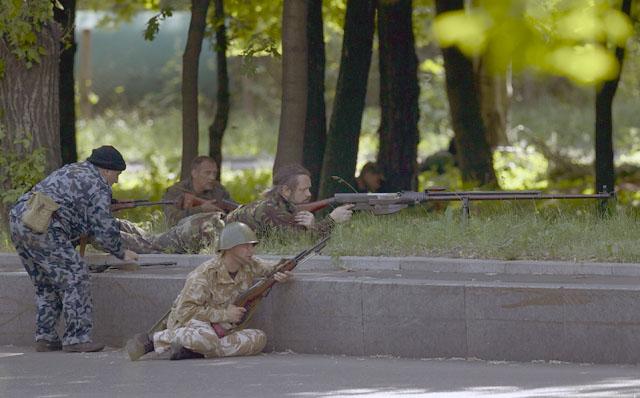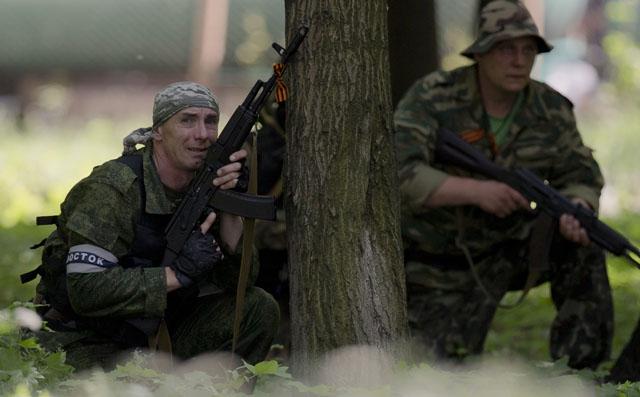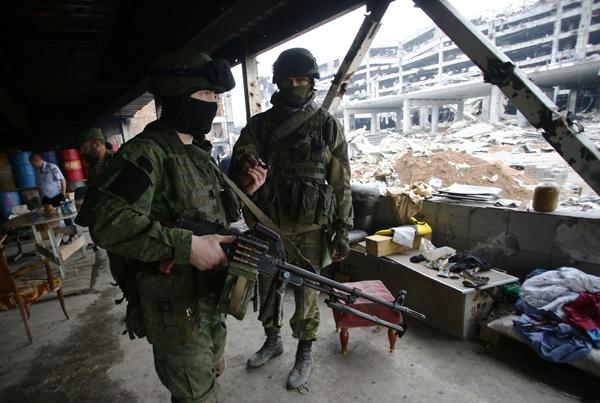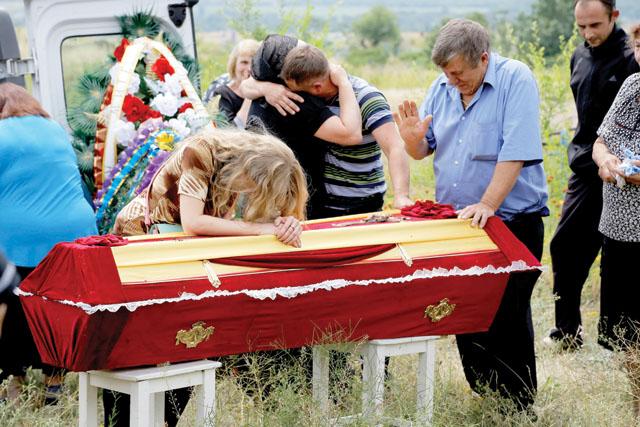You are here
Battle at Donetsk airport; new Ukraine leader says no talks with ‘terrorists’
By Reuters - May 26,2014 - Last updated at May 26,2014

KIEV/DONETSK, Ukraine — Ukraine launched air strikes and a paratrooper assault against pro-Russian rebels who seized an airport on Monday, as its newly elected leader rejected any talks with “terrorists” and said a robust military campaign in the east should be able to put down a separatist revolt in “a matter of hours”.
Ukrainians rallied overwhelmingly in an election on Sunday behind Petro Poroshenko, a political veteran and billionaire owner of chocolate factories, hoping the burly 48-year-old can rescue the nation from the brink of bankruptcy, civil war and dismemberment by its former Soviet masters in the Kremlin.
Monday’s rapid military response to separatists who seized the airport in Donetsk was a defiant answer to Moscow, which said it was ready for dialogue with Poroshenko but demanded he first scale back the armed forces’ campaign in the east.
Even as the fighting was getting under way, Poroshenko held a news conference in Kiev where he said the government’s military offensive needed to be “quicker and more effective”.
“The anti-terrorist operation should not last two or three months. It should last for a matter of hours,” he said.
As for the rebel fighters: “They want to preserve a bandit state which is held in place by force of arms,” he said. “These are simply bandits. Nobody in any civilised state will hold negotiations with terrorists.”
Gunfire and explosions could be heard as a warplane flew over Donetsk’s Sergei Prokofiev International Airport, hours after truckloads of armed rebel fighters arrived and seized a terminal. Thick black smoke rose from within the perimeter.
The government said its jets had strafed the area with warning shots and then struck a location where rebels were concentrated, scattering the fighters before paratroops were flown in to face them.
After three hours of fighting, a Reuters photographer saw three Ukrainian Mi-24 helicopter gunships fire rockets and cannon at the terminal concrete and glass terminal. More plumes of black smoke shot up into the air as the helicopters fired at targets on the runway. The gunships threw out decoy flares as fighters shot at them from the ground.
The airport serves a city of 1 million people that the rebels have proclaimed capital of an independent “people’s republic”, and where they succeeded in blocking all voting in Sunday’s election.
Their attempt to seize the airport may have been intended to prevent Poroshenko from travelling there: he has said his first trip in office would be to visit the restive east.
Preliminary results, with 80 per cent of the vote counted, gave Poroshenko 54.1 per cent of the vote — towering over a field of 21 candidates with enough support to avert a run-off. His closest challenger, former premier Yulia Tymoshenko, had just 13.1 per cent and made clear she would concede.
Poroshenko’s most urgent task is finding a modus vivendi with the giant neighbour that has seemed poised to carve Ukraine up since a popular revolt toppled a pro-Russian president in February.
He said Moscow’s “argument about legitimacy has disappeared” as he had also topped the polls among those who were able to cast ballots in Donetsk and Luhansk regions.
“I hope Russia will support efforts to tackle the situation in the east,” Poroshenko said. He said he planned to meet Russian officials in the first half of June.
But he also showed no sign of heeding Moscow’s demand that he call off the operation against rebels in the east.
“Protecting people is one of the functions of the state,” he said, promising to invest more in the army. “The Ukrainian soldier should no longer be naked, barefoot and hungry.”
So far, Ukraine’s military forces have had little success against rebels who have declared independent “people’s republics” in two provinces of the eastern industrial heartland where about 20 people have been killed in recent days.
Ukrainian officials say they have held back from using full force in part to avoid provoking an invasion from tens of thousands of Russian troops massed on the frontier. Questions have also been raised about Ukrainian forces’ training, equipment and loyalties.
Monday’s fighting began after a Reuters photographer saw three truckloads bring dozens of armed men to the airport.
“The rebels are in the terminal. The rest of the airport is controlled by the Ukrainian national guard,” airport spokesman Dmitry Kosinov told Reuters before gunfire broke out.
The Ukrainian joint forces security operation in the region said a deadline for the rebels to surrender expired and two Sukhoi Su-25 jets carried out strafing runs, firing warning shots. A MiG-29 jet later carried out another air strike.
The militants then spread out across the territory of the airport, whose state-of-the-art main terminal was built for the 2012 European soccer championships held in Ukraine.
“Right now at the airport, paratroopers have landed and are cleaning up the area,” said a Ukrainian security spokesman.
‘New Russia’
Russian President Vladimir Putin, who last month described eastern Ukraine as “New Russia”, has made more accommodating noises in recent days. He promised at the weekend that Moscow would respect the will of Ukrainians, and Foreign Minister Sergei Lavrov repeated that promise on Monday in saying Russia was ready for dialogue with Poroshenko.
Western countries put little faith in Putin’s promises, saying he has repeatedly announced he would pull troops from the frontier without doing so. They dismiss Russia’s denials it has aided the rebels, whose Donetsk force is led by a moustachioed Muscovite the EU says is a Russian military intelligence agent.
Even though separatists ensured that millions of Ukrainians were unable to vote in the eastern regions, Poroshenko’s sweeping margin of victory gives him a firm mandate that makes it harder for Moscow to dismiss him as illegitimate, as it did in the case of the interim leaders he will replace.
Many Ukrainians clearly rallied behind the frontrunner as a way to demonstrate national unity, three months after a pro-Russian president was ousted in a popular revolt and Moscow responded by seizing the Crimea peninsula, massing troops on the frontier and expressing sympathy with armed separatists.
A veteran survivor of Ukraine’s feuding political class, Poroshenko has served in Cabinets led by figures from both sides of Ukraine’s pro- and anti-Russian divide, giving him a reputation as a pragmatist who can bridge differences. That could shield him from the accusations of strident nationalism Moscow aimed at the interim leaders.
He threw his weight and money behind the revolt that brought down his Moscow-backed predecessor in February, and campaigned on a platform of strengthening ties with Europe.
Yet it remains unclear how the tycoon can turn firmly westward as long as Russia, Ukraine’s major market and vital energy supplier, seems determined to maintain a hold over the second most populous ex-Soviet republic.
“He has taken a heavy burden on his shoulders,” said Larisa, a schoolteacher who was among crowds watching the results on Independence Square, where pro-Western “EuroMaidan” protests ended in bloodshed in February that prompted President Viktor Yanukovich to flee to Russia. “I just want all of this to be over. I think that’s what everybody wants.”
In the eastern Donbass coalfield, where militants shut polling stations cutting off some 10 per cent of the national electorate from the vote, rebels scoffed at the “fascist junta” and announced a plan to drive out “enemy troops”.
More than 20 people were killed in the region last week.
Although Putin told an international audience at the weekend he was ready to work with a new Ukrainian administration, Russia could still use the gaps in the election in the east to challenge its legitimacy.
Related Articles
Ukrainian aircraft and paratroopers killed more than 50 pro-Russian rebels in an assault that raged into a second day on Tuesday after a newly elected president vowed to crush the revolt in the east once and for all.
DONETSK, Ukraine — Ukraine’s pro-Russian eastern insurgents on Wednesday accused Kiev’s soldiers of launching a new blitz near a prized but
Ukraine’s new Western-backed president is due on Thursday to submit constitutional changes expanding regional powers in the hope the measure will help calm a bloody pro-Russian insurgency convulsing his ex-Soviet state.














